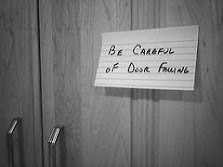Tagging, developing taxonomies and folksonomies, classifying metadata, creating subject headings-- these concepts are all wonderful in theory but in practice tend to be hellish nightmares of organization gone wrong. The idea of making stuff easy to find-- for you and anyone who might need to access your stuff-- is great but it's easy to get too involved in the details and lose sight of what's important. Make things too complicated and people will find another way to get what they want.
So if you disagree with me (or instead, if I don't argue my point well enough) feel free to click on the links I've provided at the end of this post. Read what others have to say, look at the way they've organized their content and then tell me I'm wrong. I love to argue, and afterward you will probably feel like you've won.
I'll start out with this: I believe that organization is a good thing. I read lots of books and articles about organization for fun. I love to learn new and better ways to organize (yes, I'm a dork). I keep my socks in a drawer, my shoes in a closet, my clothes on hangers. My pens and pencils are located in a cup on my desk. I file paid bills in file folders. My food is sorted by type and stored in the pantry. You get the point. But the bigger issue is this is how *I* organize my stuff.
Every organizational expert will tell you it's key to keep your system simple. The more complicated your organization system is, the less likely you (or anyone else you are trying to influence) will follow it.
So to those who like to organize information, I advocate
- keeping the systems that work (i.e. the ones that get you what you want, make your customers happy, make life easier)
- abandoning the ones that don't
- accepting that your system isn't perfect, that others will use a system that works for them, and that you should be ready to assist them no matter what
**Please note**
My husband is the most kind, loving and accomodating partner in the world and the story of his behavior (below) is highly exaggerated for the purposes of making my point.
Here's an example from my home life that illustrates my point but it's about clothes, not data. I am in charge of all things laundry-related because I "organized" a system for it some 11 years ago. I don't see the system as being unnecessarily complicated but it's complicated enough that my husband has refused to learn it. If he needs something clean to wear and I'm not around to clean it, the item goes directly to the dry cleaners.
Since I'm not willing to abandon my system (only 3 laundry meltdowns in 11 years!) and my husband isn't willing to learn it I've accepted responsibility for the laundry. And I don't (usually) complain about it. To him.
Here's another example from my former life in academic libraries (no smelly socks here): Way back when library catalogs were called OPACs and the text was green on a black background and I worked at a Reference Desk, whenever someone approached my desk and asked me to locate information on a particular subject I'd walk with them over to my valuable tool, the LC Subject Headings books, and we'd figure out the best subject headings to use for our search. Then we'd spend time together executing (what an appropriate verb, right?) the searches on the OPAC or research database. If we were lucky, we'd get good results any the user would stroll off to the stacks to find his materials.
Is it any wonder that over time the keyword search became more popular than the librarian's tool? What student has time to spend poring through books when he knows that he's still likely to miss a few sources because the heading he chose wasn't the best one?
I love the LC Subject Headings but know that system is not perfect and most people aren't going to spend their time using it. So when students started asking me questions about the keyword search I was there for them. Even when I knew they weren't going to get the same benefit from doing it "my way". So what? The users felt empowered to do their own searching and I got an opportunity to help them find what they wanted.
The last example is all about me. I needed to read a blog post from Meredith Farkas entitled Skills for the 21st Century Librarian. I went to her site to locate the post. I started out by searching her tags. They are fine but I couldn't locate the post, so after a few minutes I just used the date from my citation to locate the appropriate month/year and immediately found the post in her archive. I could have also typed the title into Google and located the post that way.
Even though an organization system exists, it's okay to use a different approach to get what you want.
Summary: I think one of the beautiful things about the web is that it's isn't organized according to any one system. Programmers and lay people can create their own organization systems. They can tag their content, create metadata to describe their stuff, arrange their bookmarked web sites, etc.
Libraries will always organize information--it's something we're good at-- but we need to think of our organizing systems in a new way. We also need to understand that other's systems aren't bad. And we need to be supportive of our users, regardless of the systems they use and the ways they search.
My defense:
David Weinberger's blog (author of Everything is Miscellaneous):
http://www.hyperorg.com/blogger/
Stephen Abram's blog:
http://stephenslighthouse.sirsidynix.com/
Library of Congress Catalog:
http://catalog.loc.gov/
OCLC member library catalog:
http://www.worldcat.org/
United States government information by topic:
http://www.usa.gov/
Google:
http://www.google.com/

No comments:
Post a Comment